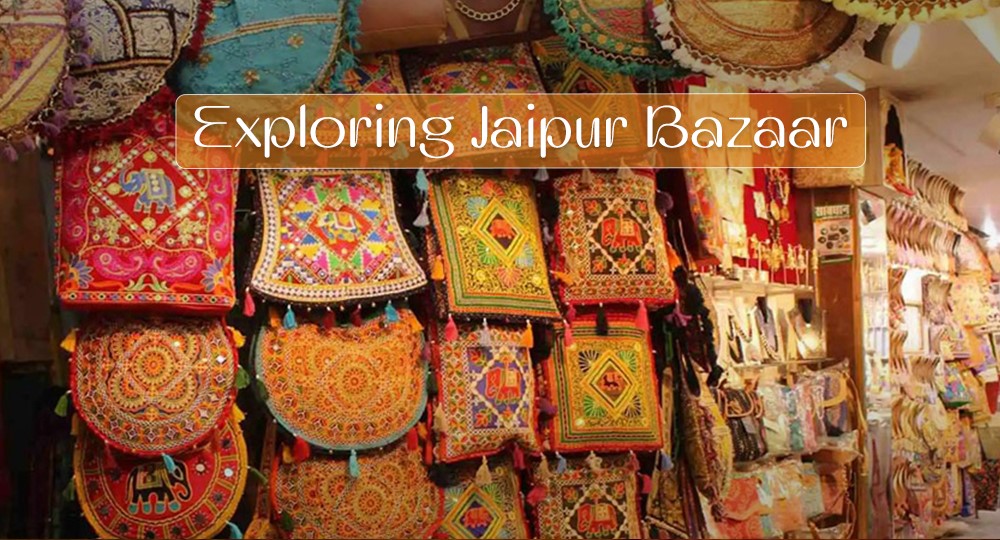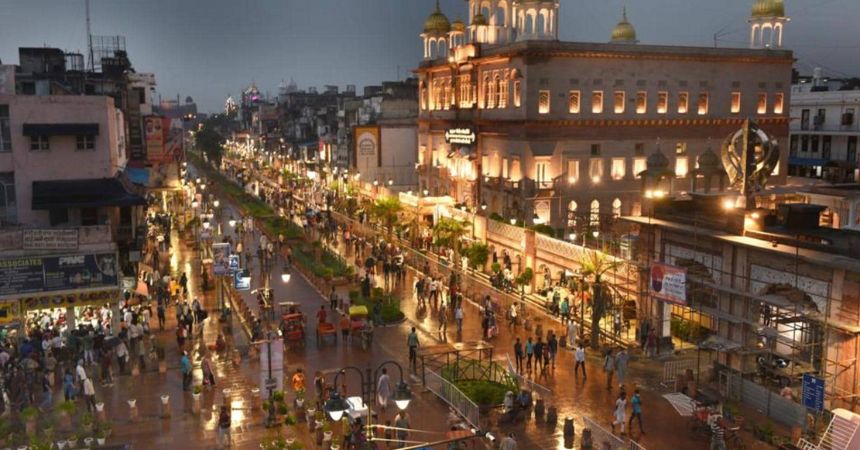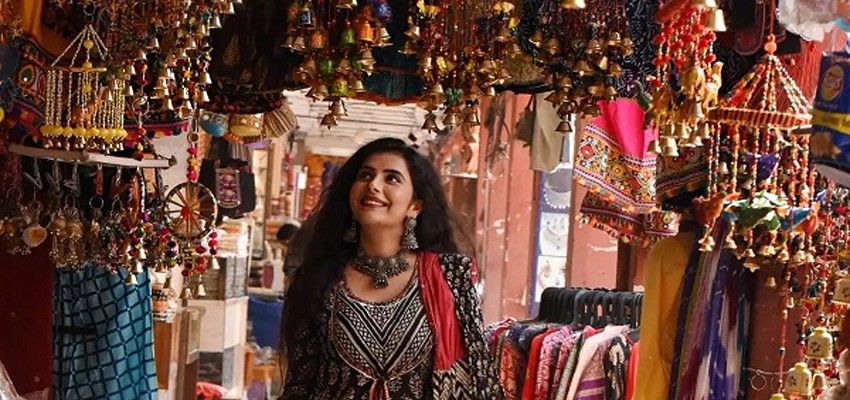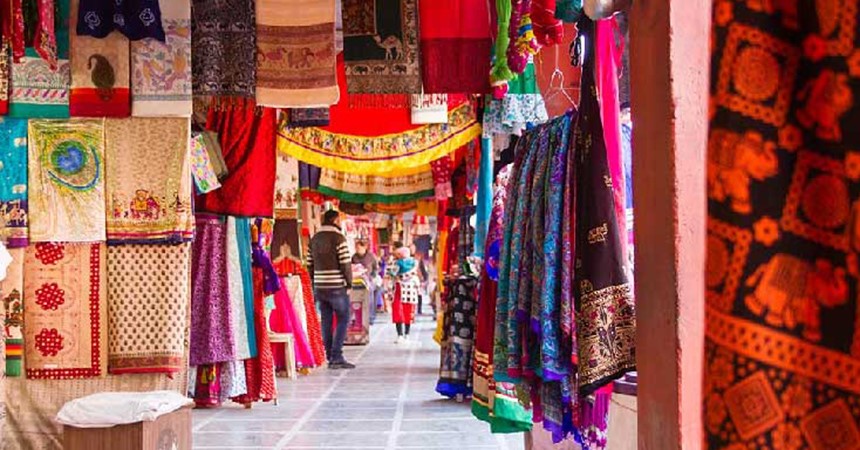Exploring Jaipur Bazaar: A Shopper’s Paradise in the Pink City

Jaipur, the colourful capital of Rajasthan, is known to be rich in heritage and fabulous architecture and, of course, busy bazaars. Among the many attractions of Jaipur, its bazaars come out as a cultural hotbed with tradition, colour, and commerce coalescing. The bazaars of Jaipur showcase everything from traditional handicrafts and textiles to jewellery, spices, and pottery, making them a popular venture for tourists and locals alike. This blog will take you on a foray into some of Jaipur's most popular and colourful bazaars, tracking down their cultural coloured backdrop, displays, and the experience it affords to the shopaholics in Rajasthan.
The Importance of Jaipur Bazaar

The word bazaar has a cultural reference in India, which symbolizes the markets typically stocked with an eclectic mix of goods and vibrancy. The bazaars of Jaipur, much like the city itself, are historic, with the charm of the old era. They afford not only shopping but also a glimpse of the city's lifestyle, architecture, and art.
Jaipur Bazaar is not merely a shopping destination; it is the very soul of the city. The bazaars create the most ideal amalgamation of traditional Rajasthani craftsmanship, modern-day commodities, and a dose of local hospitality. Hence, whether it is buying something for oneself or bringing back a souvenir from Jaipur, these markets certainly offer a unique experience.
1. Johari Bazaar: The Jewel of Jaipur

An old yet no less popular bazaar that has captivating jewels of all kinds. "Johari" means "jeweller", this market probably is rightly nicknamed. The bazaar houses an impressive assortment of traditional Rajasthani jewellery-Kundan, Meenakari, and Jadau work, which are quite popular across India and worldwide. If you wish to pick up some heirloom-class jewellery, this is definitely the place for you. Besides jewellery, the bazaars cater to fashion lovers with ethnic wear, sarees, and bandhej (tie-dye) fabrics. Turbans and decorative items of Rajasthan are also a question of a person's thrill to present visitors with great souvenirs.
Johari Bazaar is a riot of colours, intricate designs, gleaming gold, and silver pieces, and the raucous energy of shopping souls. Most definitely, this is a market you have to visit if traditional Rajasthani craftsmanship is of any interest to you.
2. Bapu Bazaar: For Shopping Enthusiasts of All Ages

Bapu Bazaar is one of the most popular and budget-friendly markets located in the heart of Jaipur. The range of textiles includes block-printed fabrics, cotton kurtas, scarves, and bedspreads. In Bapu Bazaar, you will have plenty of opportunities to buy Rajasthani handicrafts, such as puppets, wooden toys, and paintings.
Offering both modern and traditional types, the market also has leather goods including Jutis (traditional Indian shoes) and belts. Available are also colorful stands selling spices, perfumes, and Rajasthani sweets. Besides, the market is replete with handmade jewelry, traditional metalwork, and local antiques all at reasonable prices.
A market that suits both tourists and locals, as they come to buy traditional Rajasthani products without burning a hole in their pockets. Whether you're looking to take home a vibrant saree or sample the local street food, Bapu Bazaar has it all.
3. Tripolia Bazaar: Where Traditional Crafts Reach Their Pinnacle
Tripolia Bazaar is a well-acclaimed market in Jaipur filled with fine lacquerwork, traditional metalware, and brass products. If you love intricate craftsmanship, this market is a must-visit. The bazaar is also renowned for its textiles, particularly hand-woven fabrics, leather, and antique brass lamps.
Traditionally, Tripolia Bazaar has extended a long arm toward the ancient Rajasthani craft culture. A number of artisans have set up stalls with products that will simply float the boat of any connoisseur of craftsmanship. Where Tripolia Bazaar stands out from others is, of course, in the gates, even the more ornate one's architectural constructions that lend the shopping charm a historical depth.
4. Chandpole Bazaar: Approaching Tradition with Modernity
This is yet another iconic market that Jaipur is famous for: its brass work and stone carvings. Chandpole Bazaar will expose multiple decorative artifacts for the house, beautiful statues, and traditional Rajasthani furniture. Here visitors can find intricately carved wooden doors, marble sculptures, and paintings depicting Rajasthan's culture and artistic heritage.
Chandpole Bazaar showcases handmade pottery and ceramics with vibrant colours and traditional patterns. Spice markets, local food stalls, and souvenir shops selling things made from local materials line the area. Here tradition meets modernity, with modern shops sharing their space with traditional craft stores.
5. Nehru Bazaar: The Former Center for Traditional Footwear and Textiles
For those who seek traditional Rajasthani footwear, Nehru Bazaar is the one place to go. This market has earned fame for its jutidi, or handmade leather shoes. Here one is greeted by a magnificent collection that promises great comfort and a dazzling array of colors. The bazaar also has many textiles, ranging from block-printed fabrics through scarves and bandhani to tie-dye styles.
The market is a vibrant mix of local crafts, street food, and the everyday hustle of local life, making it a great place to experience the authenticity of Jaipur. Whether you're looking for an elegant pair of jutis or a colorful scarf, Nehru Bazaar will not disappoint.
6. Sireh Deori Bazaar: A gateway to the past of Pink City
Located just outside Amer Fort, Sireh Deori Bazaar offers a view of Jaipur's royal past. This bazaar is well known for its traditional handicrafts, antique items, and royal antiques. Given the proximity of this market to Amer Fort, it is a must-visit for tourists wishing to take with them something unique and historic.
Though there are stalls selling hand-painted pottery, stone jewelry, and antique coins; for those looking for soulless souvenirs that reflect Jaipur's royal past and artistic expressions, this is the place to be.
Shopping Tips for Jaipur Bazaar
Shop smart: While bartering is a fine art in Jaipur's bazaars, prices sometimes must be haggled on, especially in Bapu Bazaar and Johari Bazaar. As a rule of thumb, ask for 30% to 40% less than what is quoted, and barter your way back up.
Realness: Do check the authenticity of the goods being sold, especially antiques and jewelry, before your final purchase. Some shops will have certified pieces whereas unctuous replicas could be flaunting.
Cash is forever king: While most shops accept cards, it will still be always better to carry cash with you, since in the smaller markets choosing an option with cash will often allow you to bargain down.
Street Food: While you are shopping, do not forget to try the local street food. There are chaupati stalls, pani puri, and lassi stalls in the bazaar that enhance the shopping experience.
Conclusion: Jaipur Bazaar - A Shopper's Delight
Immerse in a shopper's paradise as the senses are bombarded with colors and sounds at Jaipur Bazaar. Ranging from sparkling gold and silver in Johari Bazaar to the radiant textiles in Bapu Bazaar, the pulses of heritage and culture are open for exploration. Markets in Jaipur promise everything-time embarkation into a shopping galore of traditional handicrafts, refined jewellery to fancy jutties.
A visit to Jaipur is incomplete without exploring these bustling markets, where history, culture, and commerce come together to create a unique and unforgettable experience. So, the next time you’re in the Pink City, be sure to set aside time to wander through the famous bazaars and take home a piece of Rajasthan’s vibrant charm.
